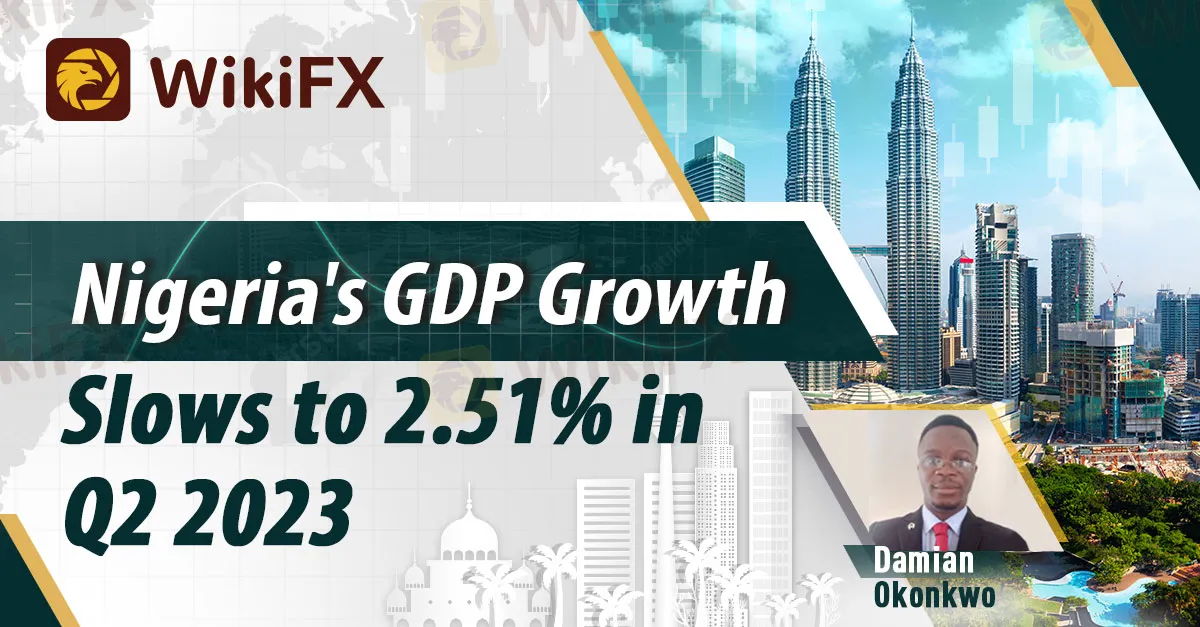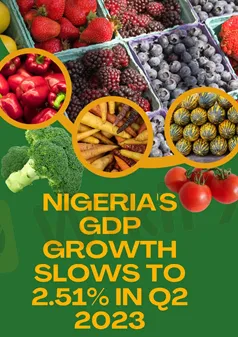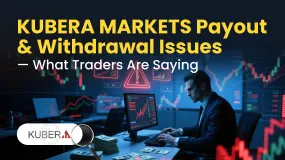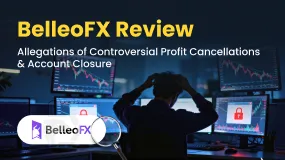WikiFX Invitation Rewards Program
Invite friends and earn points, the more you invite, the more you earn!
简体中文
繁體中文
English
Pусский
日本語
ภาษาไทย
Tiếng Việt
Bahasa Indonesia
Español
हिन्दी
Filippiiniläinen
Français
Deutsch
Português
Türkçe
한국어
العربية
Abstract:Nigeria's GDP slowed to 2.51% in the second quarter of 2023, down from 3.54% in the same quarter of 2022. This marked the lowest growth rate in Nigeria since the third quarter of 2020.

By: Damian Okonkwo

Abuja, Nigeria - Nigeria's gross domestic product (GDP) growth slowed to 2.51% in the second quarter of 2023, down from 3.54% in the same quarter of 2022, according to the National Bureau of Statistics (NBS).
This marked the lowest growth rate in Nigeria since the third quarter of 2020. The high level of decline witnessed in the country's GDP growth rate has been attributed to many factors, including:
● The removal of fuel subsidies in Nigeria in June, which has increased the cost of living for households.
● A weak currency, which has made it more expensive to import goods and services.
● A high level of debt, which is putting a strain on the government's finances.
● A lack of investment, which is hindering economic growth.
● A poor infrastructure, which is making it difficult to do business in Nigeria.
● The ongoing war in Ukraine, which has disrupted global supply chains and caused commodity prices to rise.
In addition to these factors, the Nigerian economy is also facing many other challenges, including:
● Security crisis, which is disrupting economic activity in some parts of the country.
● An increasing population with scarce resources.
● Climate change, which is causing more extreme weather events and making it more difficult to produce food.
The government has taken some steps to address the economic slowdown, including raising interest rates and devaluing the naira. However, these measures seem to have put more pressure on the economy, with more businesses folding up due to the high cost of borrowing.
Analysts are divided on the outlook for the Nigerian economy in the coming months. Some believe that the economy will continue to slow, while others believe that it will start to recover in the second half of the year.
The current economic slowdown has increased the hardship in the country, and the government is expected to take more urgent action to address the challenges facing the country.
The government can consider many measures to stimulate economic growth, including:
● Investing in infrastructure, such as roads, railways, and power plants.
● Promoting exports and attracting foreign investment.
● Reforming the education and healthcare systems.
● Working to improve the security situation in Nigeria.
The government also needs to work with the private sector to develop a plan for economic growth. The private sector is the engine of growth in any economy, and the government needs to create an environment where businesses can thrive.
Conclusion
The Nigerian economy is facing many challenges, but there are also growth opportunities. If the government takes the right steps, the economy could start to recover in the second half of the year. However, the situation could get worse if the government fails to take urgent measures to redeem the present economic distress in the region.

Disclaimer:
The views in this article only represent the author's personal views, and do not constitute investment advice on this platform. This platform does not guarantee the accuracy, completeness and timeliness of the information in the article, and will not be liable for any loss caused by the use of or reliance on the information in the article.

Invite friends and earn points, the more you invite, the more you earn!

Did you fail to receive payouts from KUBERA MARKETS despite successfully passing the trading challenge? Failed to log in to the trading account despite passing both the evaluation and funded phase? Were you surprised by the sudden nominal fee norm to receive a funded account? Did you have to go through a long withdrawal process? We have investigated these user claims while preparing this KUBERA MARKETS review article. Keep reading!

Have your past good experiences been marred by recent cases of profit cancellations by BelleoFX, a Mauritius-based forex broker? Has your trading account been blown away by the broker’s official upon your refusal to deposit more? Did the broker’s official tell you to deposit more, even if the earlier attempt turned unsuccessful? Did the high-return promise fall flat on the ground? In this BelleoFX review article, we have investigated these allegations. Take a look!

When a trading company like Dbinvesting shows up and says it's an experienced partner with great deals like high leverage up to 1:1000 and different account types, it gets people's attention. But this appeal gets clouded by more and more serious complaints from users. This creates a big problem for people thinking about investing. The main question that needs a clear answer based on facts is: Is Dbinvesting legit, or is it a clever scam that could cause you to lose a lot of capital? This investigation wants to give you that answer. We will look past the company's marketing claims to study facts we can check. Our study will carefully look at the main worries: Is Dbinvesting watched over by a trustworthy authority? What are the real, honest experiences of people who used it? Are the many reports about withdrawal problems and Dbinvesting scam claims believable? To do this, we will use solid data from third-party checking services, such as WikiFX, including their complete regulatory check
